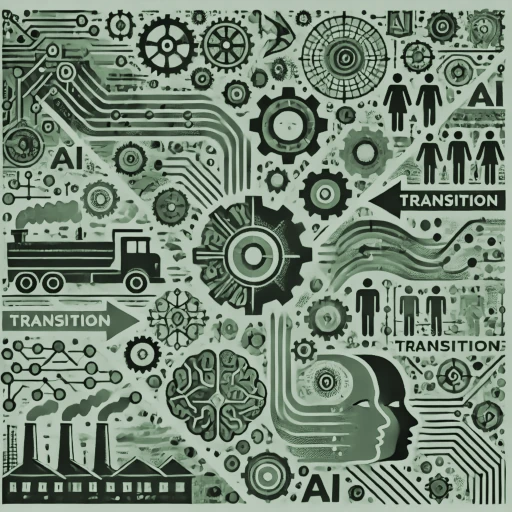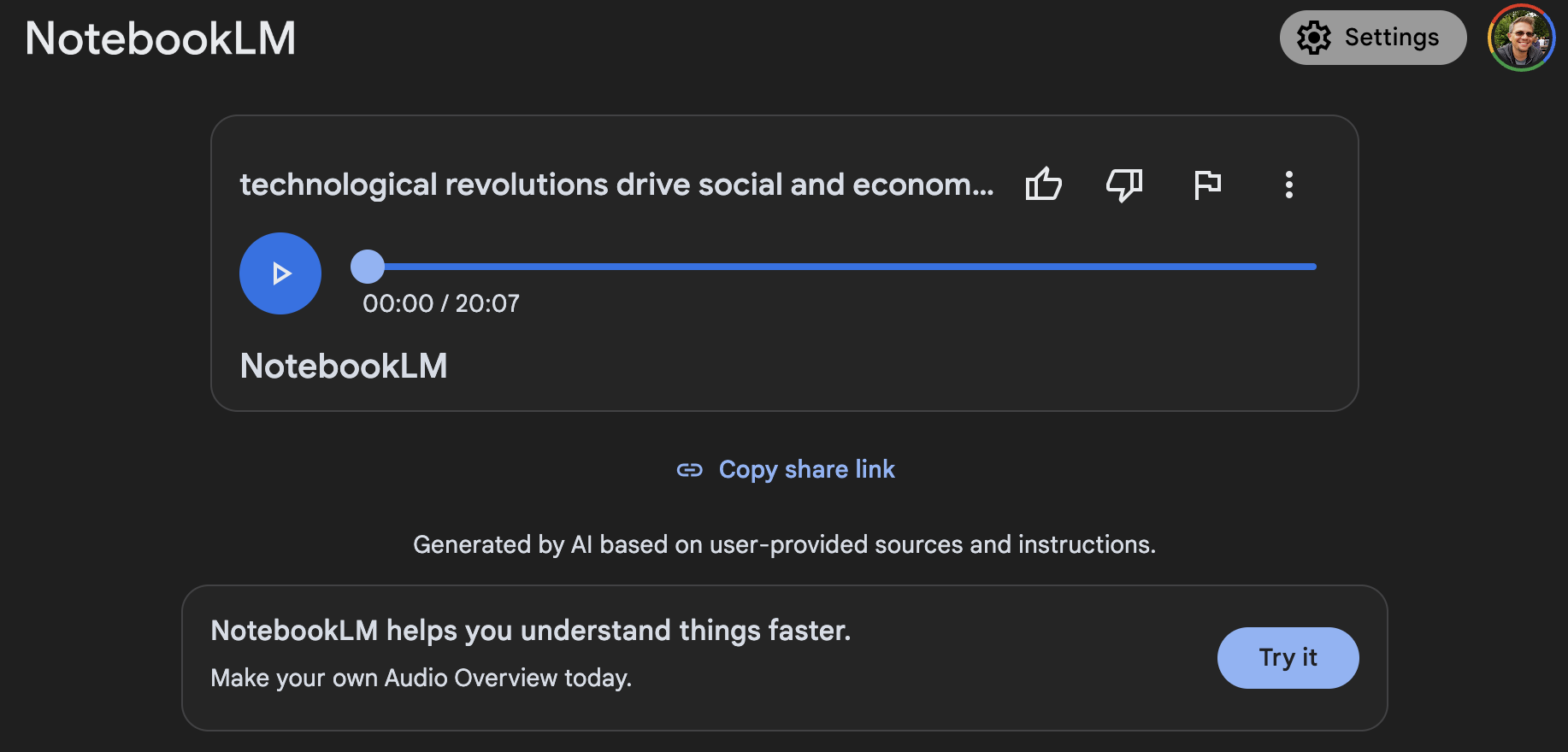Preface
My interest not only covers technology, but also in the effects it has on society and how it changes the way we live.
I wanted to learn from past events what the AI revolution in front of us might bring with it and how we as a society could approach that. In my personal surrounding I already had some discussions about that topic and at some point we could guess how things might change or find some way to relate the topic to. Pictures of reflecting about historical technological revolutions (e.g. industrial revolution) were used to make the point which reminded me of my experiences in manufacturing companies. Like the event when CNC-Machines were introduced and how it made people afraid of loosing their jobs as they were the ones operating machines replaced by the new and more complex CNC-Machines. Learning from single events is not the best idea, so I decided to look for information on the topic.
I found and interesting paper called TECHNOLOGICAL REVOLUTIONS, PARADIGM SHIFTS AND SOCIO-INSTITUTIONAL CHANGE. So I decided to use some AI Tools to dig a bit into this paper, the topic in general and to see how this AI-backed approach works out.
The evaluation of the approach and the 'interview' with ChatGPT are reflected in separate articles. This article focuses on the approach of using AI as a more or less smart way to get information from the paper. The Interview with ChatGPT digs deeper into the topic itself together with ChatGPT focussing on the challenges of change in the age of AI.
Getting information from the paper
Using NotebookLM to create a podcast summary
NotebookLM is a hot topic at the moment and I wanted to see how it feels listening to a podcast summary of the paper produced by it.
I added the paper as PDF to the NotebookLM and let it create a podcast summary. If you want to hear it, here is NotebookLM-Audio: technological revolutions drive social and economic change. 20 minutes for a 28 page paper made me think at first, but I just wanted to give it a try. It made me think because in comparison, I got a 15 minutes summary of the 500 page 2024 AI Index Report the other day.
Hearing the summary, I have to say that it does a pretty good job at creating an easy experience of listening to the paper while I was walking in the sun. Quite some time I had the impression that I have no idea where the information from the paper lies and what is made up by the AI as it was pretty high level. But hey - this is what you also get from a podcast done by humans in a way, right ?
Another aspect made me think: Up to that point I have not stated where I stand in this topic and what I am interested in. So some of the podcase content and way of presenting did not reflect what I might have imagined. But hey - I never told the AI that.
Yet it made me think and some questions came up in my mind, but I did not see the opportunity to interact with the content. The podcast seemed to be an easy starting point as I was not in a hurry and could just listen to it while walking. If I would have to analyse such information under time constraints, the podcast would have been too much babbling around and unknowingly far away from the actual content.
With the questions in mind I decided to dig deeper ... but how ? To be fair: Maybe NotebookLM would have been able to let met interact with the content but I did not try at this point ... maybe I will at a later point.
Using ChatGPT to dig deeper
Now that I knew I wanted to interact with the content, I decided to give ChatGPT a try. I am following a similar approach as described in my "Talk to your blog"-Approach - See Talk to your blog - Part 1: How to evaluate user centric interactions.
As I was still walking in the sun, I entered the voice chat functionality where i can talk and listen to the AI which I had very good experiences with already. The transcript of the conversation is one of features I like as a side effect. After uploading the paper as PDF to ChatGPT I asked it to create a short summary of the content as a first step.
ChatGPT then created a short summary with the key topics "Technological Revolutions", "Techno-Economic Paradigms", "Socio-Institutional Change", "Challenges and Social Costs".
First question: "Hello there. I'm interested in the effects to society that we could imagine happening with the broader use of AI. And specifically I want to learn from historic events and just make sense of that maybe. If we could think of something that we could make apply from back then and from such events like industrial revolutions, robotics in manufacturing, something people can relate to, and not only about Internet and the high technology stuff. Thank you."
Follow up question: "What I'm also thinking of is that there must be different effects on different people in different, you know, economical levels. So, the ones that are more dependent on the daily income and the parts of the society that are not, and also there must be some kind of differences in the near-term and long-term effects, mostly on those not having so much income and being more dependent on the regular income and not so easy having it when it comes to changing and adapting."
You can read the full version at Interview with ChatGPT as this page is about the use and not the content of the paper itself.
Conclusion
Summary
In the article we learned that understanding the societal impacts of technological revolutions, particularly in the context of AI, is crucial. By examining historical events such as industrial revolutions and the rise of mass communication, we discovered that technological advancements can lead to significant shifts in labor dynamics and income distribution. The use of AI tools like NotebookLM and ChatGPT enhances our ability to engage with these topics, allowing us to draw parallels and consider potential solutions for the challenges posed by rapid technological change.
My personal take aways
When not being under any pressure the approach shown above worked very well for me. I was very pleased by the way motivated introduction followed by interaction with content and reflection on the AIs 'knowledge' was very fluid and natural.
The way the podcast was made by NotebookLM felt very motivating and engaging but also sometimes a bit over the top. The lack of interactivity with the content felt somehow limited but I am sure you can go further with NotebookLM integrating more information and your own thoughts and questions.
In general one question stays ... "What did i just do ?"
"What did i just do ?" - A philosophical reflection
Leaving aside that it was just one paper that i took as a base which can not be a representative ... but that was not my point anyway.
What are the summary and the interaction with that paper worth ? What can i take for granted and what not ? What can I learn from all of this ?
What I would compare it to with my current understanding of LLMs: I think I just had a conversation with a group of random people having different backgrounds which I asked to read the paper for me and then tell me what it is about. Similarly, the responses I received should be approached with the same caution as when interacting with people or LLMs. Depending on their background both groups might tell me something completely different as there is no one truth or interpretation on anything.
It's the things we agree on that matter. Sometimes these are based on vagueness or misguided sources and sometimes with scientific consensus and grounded knowledge. As long as we are aware of that and do not take things for granted we can use these tools to our advantage. When unsure stay curious and challenge the information by asking followup questions as you would do when talking a person, right ?

